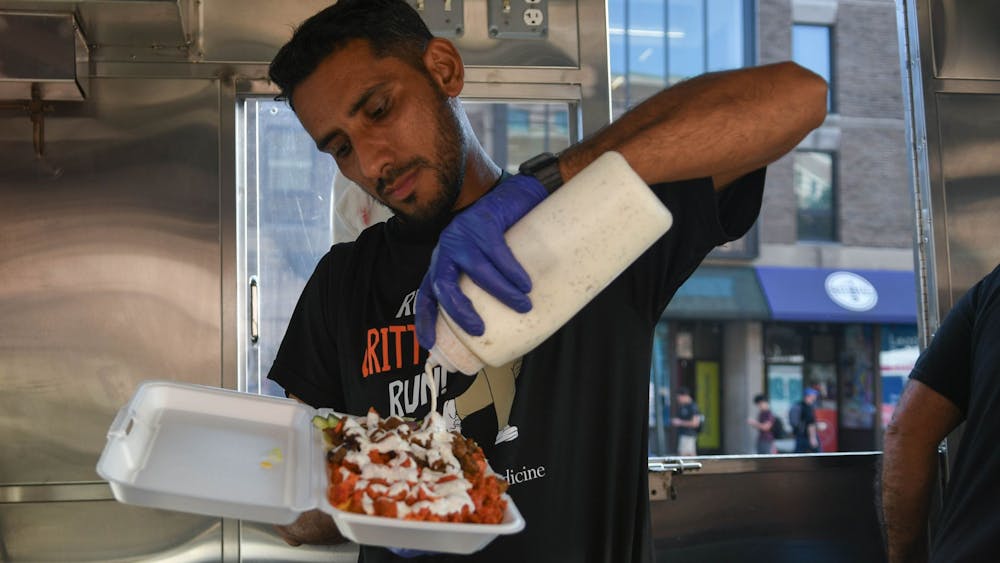The street hums with life—traffic flows by, the murmur of conversation floats in the air—a cacophony of sight and sound fusing together to form a language understood only by the urban populace. Beside you, the sidewalk is peppered with people lining up before little wheeled carts. Before you, the stainless steel counter of one cart in particular—the savory aroma of spiced meat and grilled veggies draws you in.
Of the integrated University community, there are few unacquainted with the halal experience, the essentially reverent devotion to a midday rice platter. Plates heaped with fragrant rice, tender meat, crispy greens, and the signature duo of white and red sauces slathered generously overtop. At first glance, the little red cart on the corner of 38th and Spruce streets seems just a vibrant dot amongst a sea of similarly situated vendors. A restless segment of campus, this strip is brimming with hungry students, Penn Medicine staff, and passersby fluttering to these silver stations with eager anticipation. But this cart in particular has you leaving with more than just a full stomach.
When Rahim Khan thinks of his relationship with the University community, one word comes to mind: love. It’s that devotion—evident in his warm smiles and genuine interactions—that sets him apart from the dozens of other halal carts on campus. “The food is everywhere, right?” he explains, "but if you give [them] some respect, some smiles ….” Rahim claims his friendly disposition is a quality he’s always possessed. That, and an excellent memory. If you’ve frequented his cart more than once, he’ll likely know your face and order by heart. He also regularly updates an Instagram account (@rahimredtruck) for a front–row seat to his ongoing culinary adventures.
But it’s no easy job, Rahim says. Every morning begins in his garage, where fresh rice is steamed, and meats—chicken, lamb, fish—are marinated in fragrant spices and grilled to perfection. Falafel is ground, shaped, and fried to a crisp golden brown. All of it is prepped in bulk to satisfy the lunchtime rush.
The most popular dish is chicken over rice, Rahim says. It might seem like a tired task to describe such a ubiquitous dish, but it’s worth remembering. A glistening bed of turmeric-yellow grains beneath spiced chicken shawarma, slathered in the signature white sauce—a creamy mix of yogurt, garlic, and tahini. And if you don’t mind a little heat, he’ll offer you the red—a fiery blend of hot chili peppers and various herbs. Every bite is tender, juicy, and delicious. Maybe you opt for the lamb gyro, stuffed with tender slices of meat, tomatoes, lettuce, and the same iconic sauce combo, all wrapped tightly in soft pita bread. Or, as a meatless alternative, the falafel plate—crispy balls of chickpea, seasoned and served with fresh veggies and tahini.
When Rahim reflects on his first six months in the United States, he remembers the difficulty of adjusting to a new life. His arrival in 2019 coincided with the onset of the COVID-19 pandemic and subsequent lockdowns. His largest struggle—the overwhelming difference in culture—was only underscored by isolation. “It [was] very hard,” he admits, “but right now, you know … America make[s] me strong, and I’m super happy.”
Rahim boasts of his cricket–playing abilities back in Peshawar, a Pakistani city bordering the mountains of Afghanistan. In his youth, his dream was to play for Pakistan, but he declares the halal cart follows closely. “This is my second dream, and America [gave] me this dream.”
What’s Rahim’s next big thing? After going home this December and spending time with the family he hasn’t seen in so long, it’s brick and mortar. “Rahim’s restaurant” is the vendor’s ambitious vision for the future—a place where he can offer his Spruce Street crowd an expanded menu, with dishes far beyond the scope of his little red cart. Ask him about it, and he’ll paint a picture of kabuli pulao, an Afghan staple of rice, carrots, and raisins; or the bold, ginger–and–tomato–based curry chicken karahi, native to South Asia—both are favorites of his.
But Rahim’s food is not merely a means of subsistence—it’s a microcosm of the immigrant experience. Like the dozen other halal vendors on Spruce Street (and the hundreds throughout Philadelphia), Rahim stands at a unique intersection of heritage and adaptation, a fusion that thrives in the country’s most diverse, urban spaces. The exchange that occurs before that little red cart, while fleeting, transcends the transactional. It is a bridge between his story and those who partake in it, a space where traditional flavors meet foreign demands, offering comfort to some and discovery to others.
Rahim’s emotional connection to the University community has motivated him to lay down deeper roots in the city. Though homesickness lingers, the challenges of cultural adjustment have largely faded. Philly, he says, feels like his second birthplace. “I’m just like, I’ve not come like, only a couple of years … I’m born here.”
TL;DR: Rahim's Food Truck brings the Penn community together over his home flavors, and his new dreams.
Location: Rahim can be found on the corner of 38th and Spruce streets.
Price: $
Hours: every day except Sunday.

